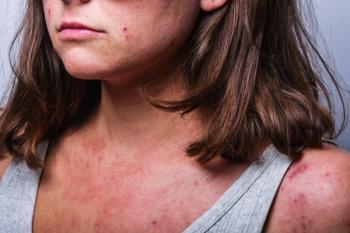
FDA approves evinacumab-dgnb in children as young as 1 year with HoFH
The approval expands on the previous indication of children 5 years and older with HoFH, approved in 2023.
Regeneron's evinacumab-dgnb (Evkeeza), an ANGPTL3 antibody as an adjunct to diet and exercise and other lipid-lowering therapies for the treatment of homozygous familial hypercholesterolemia (HoFH), is now approved for children aged 1 to less than 5 years, according to a press release from the company.1
Evinacumab-dgnb was originally approved for adults and adolescents aged 12 years and older with HoFH in 2021, before the indication was expanded to
Expanded approval to the current indication was backed by efficacy and safety data among 6 children living with HoFH, including pharmacokinetic data in 4 of these children. There were no new safety concerns identified in the compassionate use program. According to Regeneron, the most common adverse reactions (≥5%) included nasopharyngitis, influenza-like illness, dizziness, rhinorrhea, nausea, and fatigue.1
“[Evinacumab-dgnb] is a testament to the power of Regeneron’s science and proprietary technologies in developing first-in-class, lifechanging medicines that become standard-of-care,” said George D. Yancopoulos, MD, PhD, in a press release. Yancopoulos is board co-chair, president, and chief scientific officer at Regeneron.
"This label extension adds to our growing commitment to the rare disease space, which includes diverse clinical development programs in neuromuscular and genetic diseases – such as myasthenia gravis, otoferlin hearing loss, and fibrodysplasia ossificans progressiva – for which we’ve shared data," added Yancopoulos.
HoFH impacts approximately 1300 people in the United States, and occurs when 2 copies of the FH-causing genes are inherited, 1 from each parent. This results in high levels of typically more than 400 mg / dL of low-density low-density lipoprotein cholesterol (LDL-C).
Those impacted face risk for premature atherosclerotic disease and cardiac events even in their teenage years. Many patients are not diagnosed or are only diagnosed later in life.
“The approval of Evkeeza for children as young as 1 year of age addresses a critical unmet need for those with homozygous familial hypercholesterolemia, a life-threatening condition that causes extraordinarily high LDL-C levels from birth,” said Katherine Wilemon, founder and CEO of the Family Heart Foundation. “Families and their medical teams will now have an effective treatment option for these very young children who are at risk of serious complications from diseased arteries and calcified valves without timely and sufficient LDL-C lowering. This development underscores the importance of, and urgency needed in, identifying children with FH through pediatric screenings in accordance with guidelines.”
Prior indication expansion
The first expansion of evinacumab-dgnb, to include children aged 5 to 11 years, occurred on March 22, 2023. The approval was backed by positive data from a 3-part, single-arm, open-label trial evaluating Evkeeza as an adjunct to other lipid-lowering therapies.2
Patients entered the study with a more than double average LDL-C level, 264 mg/dL vs a target of less than 110 mg/dL. When administered Evkeeza, the patients’ LDL-C levels were reduced by 48% at week 24 on average, thus, achieving the study’s primary endpoint. Additionally, investigators observed significant reductions in key secondary endpoints such as levels of apolipoprotein B (ApoB), non-high-density lipoprotein cholesterol (non-HDL-C) and total cholesterol.
Evkeeza’s safety profile was also consistent with that of adults and pediatric patients 12 years and older; however, investigators also recorded an additional adverse reaction of fatigue, occurring in 15% (n = 3) of patients.
References:
- Evkeeza (evinacumab-dgnb) ANGPTL3 Antibody Approved in the U.S. for Children as Young as 1 Year Old with Ultra-Rare Form of High Cholesterol. Regeneron. Press release. September 26, 2025. Accessed September 26, 2025. https://newsroom.regeneron.com/news-releases/news-release-details/evkeezar-evinacumab-dgnb-angptl3-antibody-approved-us-children
- Ebert M. FDA extends approval of Evkeeza for homozygous familial hypercholesterolemia in young children. Contemporary Pediatrics. Published March 22, 2023. Accessed September 26, 2025. https://www.contemporarypediatrics.com/view/fda-extends-approval-of-evkeeza-for-homozygous-familial-hypercholesterolemia-in-young-children
Newsletter
Access practical, evidence-based guidance to support better care for our youngest patients. Join our email list for the latest clinical updates.






